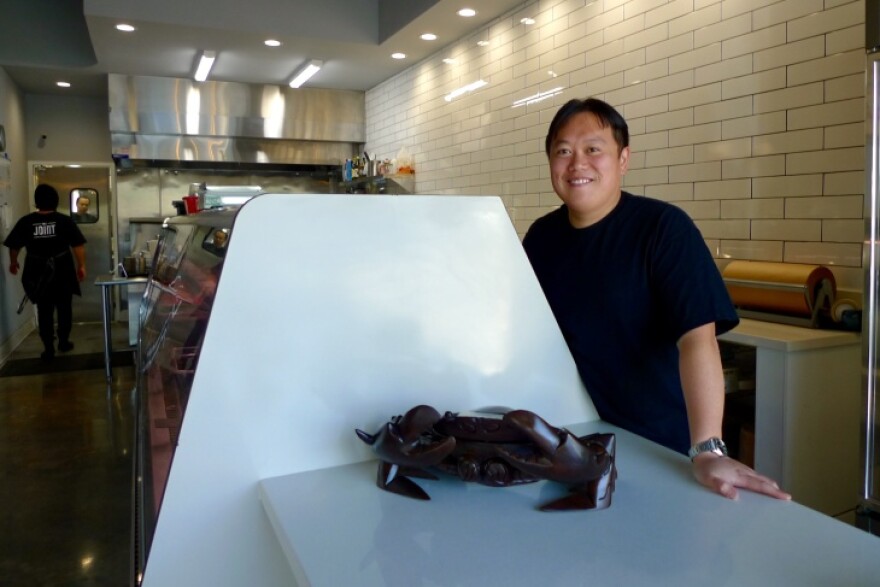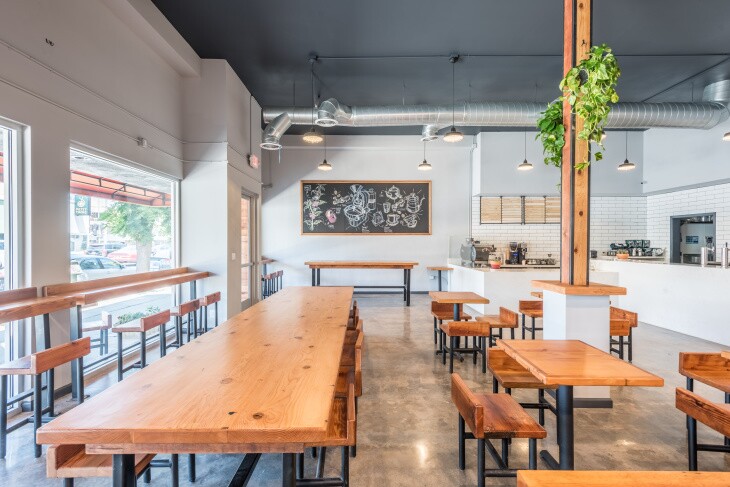This story is free to read because readers choose to support LAist. If you find value in independent local reporting, make a donation to power our newsroom today.
Meet The Fish Whisperer Who Just Opened A Sustainable Seafood Shop In Sherman Oaks

Liwei Liao loves everything about fish. Going fishing, preparing his catch, cooking, eating, talking about it with anyone who'll listen. In June, he brought all of those interests together, opening The Joint in Sherman Oaks. The business model combines a sustainable fish market, a seafood café and a coffee bar with locally roasted Copa Vida beans into what Liao hopes will become a hub for SoCal seafood.
"As soon as I could walk, I have picture of me fishing," Liao says with a smile. When he was four years old, his father, a general in the Taiwanese military, retired early and moved his family to the United State, settling in Queens. Liao's father went into real estate and eventually owned several properties including mom and pop shops, liquor stores, sushi restaurants and laundromats. His father still found time to take him fishing.
"We always had a family boat. We kept it in Stamford, Connecticut about 40 minutes from Bayside where we lived," Liao says. They would catch striped bass, fluke, porgies, tuna and cod in Long Island Sound. His father still takes his boat out.
When Liao was old enough to start working with sharp knives, he learned to gut and clean fish. "Like other Asian families, fish was such a critical part of the meal," says Liao. "When we were catching it, always that special care for what we should do to it to make it taste better."

Those experiences shaped Liao's own ideas about how to handle fish. "There are a lot of little details. Seasonality, water temperature, how we care for the fish after we catch it. The different ways of cleaning and bleeding it. The chemistry inside the fish so that the flesh stays prime."
In Liao's house, everyone cooked together. "When fish is fresh like that, we did very little to it," Liao says. "We either steamed it, salt baked it or oven baked it. A lot of lemon, pepper, salt, garlic salt or ponzu." At a young age, he also began learning Japanese techniques from his uncle, a sushi chef.
Liao moved to Los Angeles to study engineering at UCLA. In 2010, after a series of jobs in ecommerce and event production, he launched The Boba Truck, serving drinks inspired by his native Taiwan. It was the stepping-stone that led to The Joint.
"My relatives would tell me, 'Hey, you know so much about fish. You should have a fish market.'" Busy with the Boba Truck, he didn't have much time to go fishing but had trouble finding good seafood. Ever the perfectionist, Liao the idea of having his own joint started to feel like a necessity.

Sourcing sustainable seafood is Liao's top priority and biggest challenge. Six days a week, at 4 a.m., he heads to downtown Los Angeles to buy fish at International Marine Products, L.A. Fish and Ocean Group. The hands-on interaction is invaluable.
"Once you are there day in and day out, you see patterns. You see how the fish are shipped. You see the quality, how it tastes, the availability," Liao says. He looks at the fins, eyes and the gills for clues about the conditions they were raised in. He also looks for bruising or other signs of damage during transportation.

Unlike many fish markets and restaurants, which order from a list of available fish, Liao handpicks every fish sold at The Joint. Because he brings in almost everything whole, rather than as filets, he also has to figure out how to use cuts that are hard to sell. After slicing the filets, he scrapes the soft meat left on albacore bones and uses it to make tartare. Liao will serve a seafood roll every day but he can't promise it'll be a lobster roll. It might be made with wild shrimp from Baja or Box Crab caught in Santa Barbara. Since Crabs reproduce quickly, they're one of the most sustainable seafood options.

Sheila Bowman, the Seafood Watch Manager of Culinary & Strategic Initiatives at the Monterey Bay Aquarium, works with chefs and fish markets that are trying to follow sustainable practices. She praises Liao's business model. "There is so much fraud and unfamiliarity that play off of each other," says Bowman. "There are reports of fish species being substituted and sold as another variety and other non-sustainable and underhanded practices." Bringing in whole fish is one of the best ways to insure accuracy.

When assessing sustainability, Seafood Watch focuses on several factors. "There are four components we look at for sustainability. For the fish, are its populations in good shape? Fish like blue fin tuna we would say is not in good shape. Then we look at how are you catching it. Is it a fishing gear that is destructive or a fishing gear that has less bycatch? We look at how effective the management is. Is the human factor really doing smart things like setting size limitations? Then we look at overall habitat impacts. Is catching this fish having an impact on the sea floor? Are we catching smaller fish that are in the food chain for larger ones like whales?"
Bowman believes that when consumers ask those questions about sustainability, it compels businesses to adopt more sustainable practices.

If anyone asks Liao about the sustainability of his product, he'll happily share his knowledge. He knows some people are intimidated by seafood and he wants to inspire them to be more adventurous. Liao plans to hold classes, offering small group and private lesson in knife skills, fish butchery and cooking — even if it means his customers eventually don't need all of his services.
"The best thing is to be able to do it yourself," Liao says. "If you do it simply, it will taste better than any restaurant."

The Joint: 13718 Ventura Blvd., Sherman Oaks. 818-510-0626.








